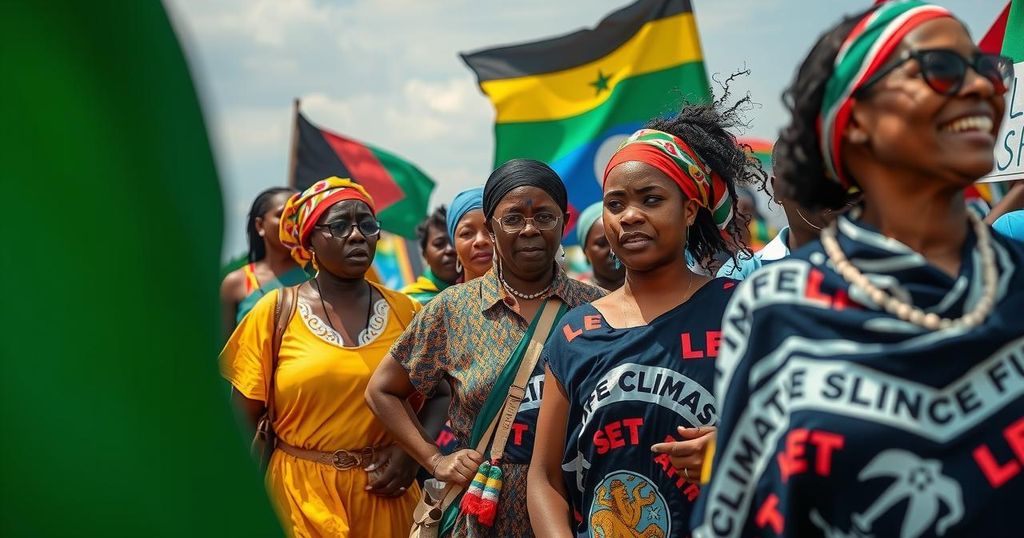Senegalese women marched in Dakar for climate justice ahead of COP29, urging polluting nations to reduce emissions. Participants expressed frustration over insufficient action and called for reparations from developed countries. Record floods this year have highlighted the immediate impacts of climate change in Senegal, prompting activists to demand accountability and adherence to the Paris Agreement.
On Saturday, approximately 50 Senegalese women climate activists rallied in Dakar, advocating for climate justice as the 2024 UN Climate Change Conference (COP29) approaches. This annual march, which has taken place since 2021, emphasized the urgency of their message this year. Participants chanted calls for accountability from nations they termed “polluting countries,” stressing the need for a decarbonized future and protection of local resources. Despite their consistent efforts over the past four years, participants expressed frustration, noting, “It’s been four years that we’ve been marching, and nothing’s changed. They’re spending billions to do their conferences, but they owe us billions in compensation,” said Cheikh Niange Faye, a former tour guide. This sentiment reflects the broader sentiment among many in rural Senegal, particularly as they faced record floods this year that devastated crops and affected thousands. Activists contend that wealthy nations, responsible for a significant share of greenhouse gas emissions, owe reparations to African nations bearing the brunt of climate change. According to statistics from the Carbon Disclosure Project, Africa contributes only 3.8% to global emissions. Khady Camara, the march’s main organizer, called upon attending countries to adhere to the commitments established in the Paris Agreement. Environmental activist Khady Faye highlighted the ongoing environmental degradation in her region, stating, “Think about the suffering of these communities, think about the suffering of these women. Try to leave our delta alone, try to leave the gas at Sangomar underground, to let the community live normally.” This reflects a growing concern over the expansion of offshore drilling activities that threaten local ecosystems and livelihoods.
The issue of climate justice has become increasingly pertinent, particularly in developing regions like Senegal, where the impacts of climate change are felt acutely. As global discussions on climate change continue to unfold, marginalized communities are raising their voices against the disproportionate effects they suffer due to the actions of industrialized nations. Senegal, like many countries in the Sahel region, has experienced significant environmental changes, including flooding and coastal erosion, exacerbated by climate change and industrial activity. Activism within Senegal is centered around the demand for accountability from major polluters and appropriate action toward mitigation and reparations.
In conclusion, the march in Dakar stands as a powerful declaration from Senegalese women demanding climate justice ahead of COP29. Their poignant critiques underscore the broader call for accountability from industrialized nations, which continue to contribute substantially to greenhouse gas emissions while developing countries confront the destructive consequences of these actions. The consistent dialogue surrounding this issue is essential in seeking equitable solutions and addressing the urgent needs of vulnerable communities.
Original Source: abcnews.go.com






